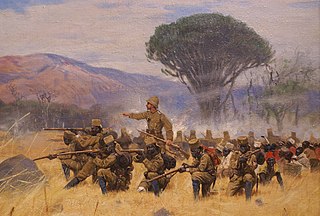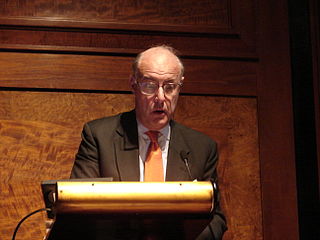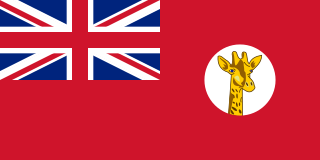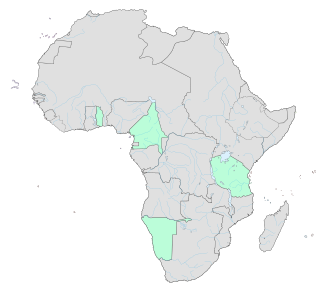External links
- Page at St John's College, Cambridge
- Biography by the Society of Old Framlinghamians
- Africans: The History of a Continent (second edition)
John Iliffe | |
|---|---|
| Born | 1 May 1939 |
| Nationality | British |
| Known for | Historian of Africa |
| Notable work | The African Poor: A History |
| Awards | Herskovits Prize (1988) |
John Iliffe (born 1 May 1939) is a British historian, specialising in the history of Africa and especially Tanzania. He was Professor of African History at the University of Cambridge and fellow of St John's College, Cambridge. He was awarded the 1988 Herskovits Prize for The African Poor: A History.
Iliffe was a fellow of the British Academy from 1989 to 2006.

German East Africa was a German colony in the African Great Lakes region, which included present-day Burundi, Rwanda, the Tanzania mainland, and the Kionga Triangle, a small region later incorporated into Mozambique. GEA's area was 994,996 km2 (384,170 sq mi), which was nearly three times the area of present-day Germany and almost double the area of metropolitan Germany at the time.

Chief Olusegun Matthew Okikiola Ogunboye Aremu Obasanjo is a Nigerian general and statesman who served as Nigeria's head of state from 1976 to 1979 and later as its president from 1999 to 2007. Ideologically a Nigerian nationalist, he was a member of the Peoples Democratic Party (PDP) from 1998 to 2015, and since 2018.

Eamon Duffy is an Irish historian. He is the Emeritus Professor of the History of Christianity at the University of Cambridge, and a Fellow and former president of Magdalene College.

The Maji Maji Rebellion, was an armed rebellion of Africans against German colonial rule in German East Africa. The war was triggered by German colonial policies designed to force the indigenous population to grow cotton for export. The war lasted from 1905 to 1907, during which 75,000 to 300,000 died, overwhelmingly from famine. The end of the war was followed by a period of famine, known as the Great Hunger (ukame), caused in large part by the scorched-earth policies used by governor von Götzen to suppress the rebellion. These tactics have been described by scholars as genocidal.
Terence "Terry" Osborn Ranger was a prominent British Africanist, best known as a historian of Zimbabwe. Part of the post-colonial generation of historians, his work spanned the pre- and post-Independence (1980) period in Zimbabwe, from the 1960s to the present. He published and edited dozens of books and wrote hundreds of articles and book chapters, including co-editing The Invention of Tradition (1983) with Eric Hobsbawm. He was the Rhodes Professor of Race Relations at the University of Oxford and the first Africanist fellow of the British Academy.

William Owen Chadwick was a British Anglican priest, academic, rugby international, writer and prominent historian of Christianity. As a leading academic, Chadwick became Dixie Professor of Ecclesiastical History in 1958, serving until 1968, and from 1968 to 1983 was Regius Professor of History. Chadwick was elected master of Selwyn College, Cambridge, and served from 1956 to 1983.

Sir David Nicholas Cannadine is a British author and historian who specialises in modern history, Britain and the history of business and philanthropy. He is currently the Dodge Professor of History at Princeton University, a visiting professor of history at Oxford University, and the editor of the Oxford Dictionary of National Biography. He was president of the British Academy between 2017 and 2021, the UK's national academy for the humanities and social sciences. He also serves as the chairman of the trustees of the National Portrait Gallery in London and vice-chair of the editorial board of Past & Present.
The Zaramo people, also referred to as Dzalamo or Saramo, are a Bantu ethnic group native to the central eastern coast of Tanzania, particularly Dar es Salaam Region and Pwani Region. They are the largest ethnic group in and around Dar es Salaam, the former capital of Tanzania and the 7th largest city in Africa. Estimated to be about 0.7 million people, over 98% of them are Muslims, more specifically the Shafi'i school of Sunni Islam. Zaramo people are considered influential in Tanzania popular culture with musical genres like Sengeli originating from their community in Kinondoni District. Their culture and history have been shaped by their dwelling in both urban and rural landscapes.
Ndabeni is an industrial suburb of Cape Town, South Africa, mainly occupied by light industries such as textiles and clothing. It is located about 6 km east of Cape Town city centre and is serviced by a railway station. Ndabeni is bordered to the south east by Pinelands and to the north by Maitland. Its postcode is 7405.
The Gogo also known as Gongwe(Wagogo, in Swahili) are a Bantu ethnic and linguistic group based in the Dodoma Region of central Tanzania. In 1992 the Gogo population was estimated to number 1,300,000..
Henry Mathison Pelling was a British historian best known for his works on the history of the British Labour Party.
The Bondei People are a Bantu ethnic group based in Muheza District and Pangani District of eastern Tanga Region in Tanzania. The Bondei speak Kibondei, Bantu language and are culturally related to the Shambaa ethnic group.

Tanganyika was a colonial territory in East Africa which was administered by the United Kingdom in various guises from 1916 until 1961. It was initially administered under a military occupation regime. From 20 July 1922, it was formalised into a League of Nations mandate under British rule. From 1946, it was administered by the UK as a United Nations trust territory.
David Edgerton FBA is an English historian and educator. He was educated at St John's College, Oxford, and Imperial College London. After teaching the economics of science and technology and the history of science and technology at the University of Manchester, he became the founding director of the Centre for the History of Science, Technology and Medicine at Imperial College, London, and Hans Rausing Professor. He has held a Major Research Fellowship (2006–2009) from the Leverhulme Trust. In 2013, he led the move of the Centre for the History of Science, Technology and Medicine to the Department of History of King's College London. Edgerton's books include Warfare State: Britain 1920–1970 and The Shock of the Old: Technology and Global History since 1900. Edgerton was elected a fellow of the British Academy in 2021.

Germany colonized Africa during two distinct periods. In the 1680s, the Margraviate of Brandenburg, then leading the broader realm of Brandenburg-Prussia, pursued limited imperial efforts in West Africa. The Brandenburg African Company was chartered in 1682 and established two small settlements on the Gold Coast of what is today Ghana. Five years later, a treaty with the king of Arguin in Mauritania established a protectorate over that island, and Brandenburg occupied an abandoned fort originally constructed there by Portugal. Brandenburg — after 1701, the Kingdom of Prussia — pursued these colonial efforts until 1721, when Arguin was captured by the French and the Gold Coast settlements were sold to the Dutch Republic.
John Andrew Gallagher, known as Jack Gallagher, was an historian of the British Empire who between 1963 and 1970 held the Beit Professorship of Commonwealth History at the University of Oxford and from 1971 until his death was the Vere Harmsworth Professor of Imperial and Naval History at the University of Cambridge.
The Faculty of History at the University of Oxford organises that institution's teaching and research in medieval and modern history. Medieval and modern history has been taught at Oxford for longer than at virtually any other university, and the first Regius Professor of Modern History was appointed in 1724. The Faculty is part of the Humanities Division, and has been based at the former City of Oxford High School for Boys on George Street, Oxford since the summer of 2007, while the department's library relocated from the former Indian Institute on Catte Street to the Bodleian Library's Radcliffe Camera in August 2012.
Michael John Bentley is an English historian of British politics in the nineteenth and early twentieth centuries. He is Emeritus Professor of Modern History at the University of St Andrews and is currently Senior Research Fellow in History at St Hugh's College, Oxford. He is the biographer of the historian Herbert Butterfield, a former Master of Peterhouse, Cambridge.
Karagwe Kingdom was a historical Bantu state in present-day Karagwe District of Kagera Region in northwestern Tanzania, between Rwanda and Lake Victoria. East Africa's influential Karagwe Kingdom was ruled by a hereditary monarchs whom were reputed to be Bachwezi descendants. By the end of the 20th century, it had thriving trade with traders from all parts of East Africa, especially slave trading Arabs. Bweranyange served as the Karagwe kingdom's capital.
Vugha or Vuga is historic village located inside Bumbuli District of Tanga Region in Tanzania. The settlement was established as the capital of the Kilindi dynasty.